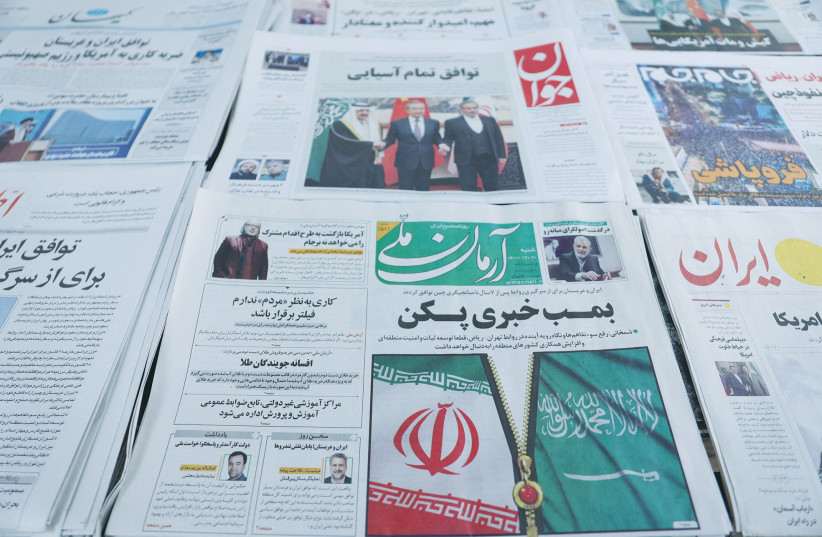There are diplomatic liaisons and talks taking place that have me alarmed. The United States and Israel should be seriously worried about the renewal of talks, and the building of relationships, between Iran and Saudi Arabia. The United States and Israel also should be very concerned about China’s involvement with Iran and Saudi Arabia. But it is this newly burgeoning relationship between Iran and Saudi Arabia that is sending sends shivers down my spine.
Iran and Saudi Arabia, long-time nemeses, are expert gamers when it comes to international diplomacy. Saudi Arabia is simultaneously engaged in diplomatic liaising with Iran and engaged in navigating a US-brokered deal between their country and Israel. And not just any deal. This would be a deal that includes a resolution of the decades-old, until now unsolvable, Palestinian-Israeli issue. A deal that would, presumably, involve some form of Palestinian statehood or independence.
Any diplomatic venture that includes Iran is extremely dangerous for Israel and the region. Iran cannot be trusted. Iran is not a responsible party to any agreement.
This axiom is essential.
You can never trust Iran
The tensions that have existed between Iran and Saudi Arabia have been very important in keeping an equilibrium in the region. These two significant regional powers balanced one another. Their tensions kept them in check, and it staved off a head-to-head confrontation between the region’s Shi’ite (Iran) and Sunni (Saudi Arabia) populations. Until now, they encouraged their proxies to battle it out. And as a result, larger regional conflicts were minimized.

That was then. Times have changed. Nowadays, the attraction of creating a working relationship with Iran has become very attractive to the Saudis. And while I am not at all sure that this, until now elusive, goal will come to fruition, Iran and Saudi Arabia are both willing partners in the challenge of forging liaisons. A deal may backfire. And if that happens, it will cause great damage to the Saudi empire.
As the leader of the Shi’ite world, Iran has nothing but disdain toward all Sunnis – even, and especially, toward Saudi Arabia specifically, because the leaders of Saudi Arabia are the leaders of the Sunni Muslim world. Shi’ites have been holding a grudge against the Sunnis for over 1,400 years. The anger is visceral.
That animosity will not dissipate or melt away with the signing of a piece of paper. It cannot erase a heritage of hatred that dates back to the period of Muhammad. A central issue in their conflict is the long-ago dispute over who should succeed the Prophet Muhammad. Also at issue are major disputes over the Quran and the hadith.
There have been public assassinations. There have been bloody massacres. There is even a dispute over the death of Muhammad. Sunnis believe that he was poisoned by a Jewish woman. Shi’ites blame his two wives for the deadly deed.
IRANIAN FOREIGN Minister Hossein Amir-Abdollahian recently visited Saudi Arabia. According to the press reports their meetings were productive. His office reported that the meetings were the lead-up to normalizing diplomatic relations between the nations.
This recent visit was part two of face-to-face negotiations between Iran and Saudi Arabia. Part one took place in June, when Saudi Prince Faisal visited Tehran and met with the Iranian leadership.
There is no love lost between these two countries. They have been on opposite sides of the conflicts in Syria, Yemen, and Iraq. The most recent division came on January 3, 2016, when Saudi Arabia pulled its ambassador and closed its embassy in Iran. The move followed the January 2 Saudi execution of the Saudi-born Shi’ite cleric Sheikh Nimr. In response, Iranians rioted and burned the Saudi embassy in Tehran.
The previous year, during the haj in Mecca, a swelling stampede resulted in the deaths of over 2,000 Iranian Shi’ites who were making their pilgrimage. The Saudi crown prince at the time blamed the Iranians and suggested barring them from all future pilgrimages.
This year, for the first time in eight years, Iranians were permitted to return and participate in the haj. It was a test that Iran passed with flying colors. And today, the Saudis are hoping that Iran will endorse Riyadh’s bid to host Expo 2030.
Iran has many reasons for wanting to normalize relations with Saudi Arabia. And as important as access to the holy sites in Mecca and participation in the haj are, they don’t top the list. Iran also wants religious superiority over the Sunnis. They want all Muslims to unite under their leadership. Their ultimate goal is to oust Saudi Arabia as the leader of the Muslim world.
Of the 1.6 billion Muslims in the world today, 85% are Sunni, 15% are Shi’ites. Under normal conditions, Iran would never become a leader of the Muslim world. Mending ties with Saudi Arabia is, Iranian leadership hopes, the path to achieving that goal.
For Israel, that alliance will be disastrous.
The writer is a social and political commentator. His new TV show is Thinking Out Loud on the Jewish Broadcasting Service. His latest book is Thugs.
